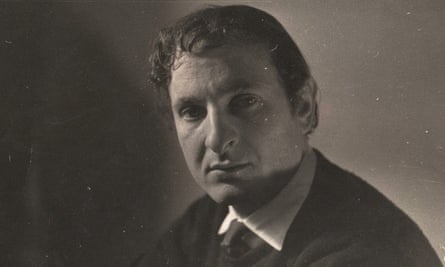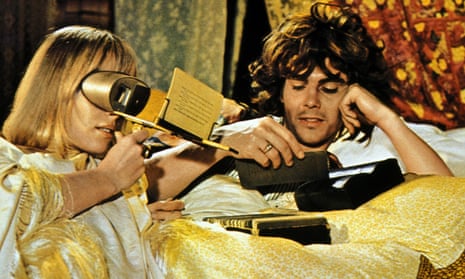Who was David Litvinoff? To certain aficionados of London in the 1960s, his is a fabulously enigmatic name who connects discrete worlds that collided to create the seismic social upheavals of that decade. He knew the Krays and the Stones, Lucian Freud and Peter Rachman, Eric Clapton and George Melly, and a whole gallery of aristocrats, rock stars, artists and criminals.
He contributed to the William Hickey gossip column in the Daily Express, was doorman at a Soho clip joint, and was “dialogue adviser” and “technical consultant” on Donald Cammell and Nicolas Roeg’s cult classic Performance, in which Mick Jagger and James Fox trade psychic places as rock god and gangster. But more than anything he was a raconteur, a brilliant storyteller and fabulist who played court jester to the Chelsea set of the 1960s.
Keiron Pim has set out to write the definitive biography of a man who was the very definition of an unreliable narrator. Although he dreamed of being a writer, Litvinoff left very few written words. What survives him are the stories, the myths, his strange and unlikely connections to everyone who was someone.
As a consequence, as Pim readily acknowledges, it’s extremely difficult to establish what’s true and what’s legend. Was Litvinoff the tremendously influential cultural figure behind the scenes that others before Pim, including Iain Sinclair, have investigated? Or was he just an East End spieler, prodigious networker and charming social parasite on the make?

He was born in 1928 into a poor Jewish family, emigres from Russia, in Whitechapel. His older half-brother was the novelist Emanuel Litvinoff and another older brother, Barnet Litvinoff, was the historian and official biographer of David Ben-Gurion, Israel’s first prime minister. The younger brother, however, preferred to live off his wits rather than his natural intelligence.
Homosexual and headstrong, he was drawn first to society’s margins – the East End criminal underworld and the illicit hedonism of Soho – before finding his way into society. He was no stranger to violence, both that which he inflicted on others and that which he suffered himself. When the Rolling Stones were arrested on drugs charges in 1967, Litvinoff and part-time actor and full-time thug John Bindon badly beat up a young man Litvinoff wrongly suspected of being the informer. They hung him out of a window by his ankles.
Litvinoff himself suffered the same fate and was once slashed so badly across his face that his mouth was shaped into a horrific smile. The Krays were (probably incorrectly) blamed for that piece of macabre theatre, even though Litvinoff and Ronnie Kray once shared a lover and briefly a flat. But it’s also been suggested that Lucian Freud commissioned the crime. The two men fell out after Freud painted Litvinoff in a portrait he entitled The Procurer. Like so much about Litvinoff’s life, there is no way of knowing what the reality was.
This is both the strength and weakness of Pim’s fascinating biography. In the absence of documentary evidence, Pim is left with a near limitless canvas of possibilities. At one stage he writes despairingly of his efforts to unearth the truth. “Everything began to connect, or rather held the promise of connection if I would only look hard enough.” He speaks of “apophenia”, “the experience of perceiving meaningful patterns in random phenomena”.
At times, it seems like Pim places Litvinoff at the secret controls of everything that happened of note in London between 1963 and 1970. At others, you sense a Wizard of Oz character who, when the curtain is pulled back, has little to offer but a great line in patter. But in the huge digressions Pim makes to set up the sometimes painfully tenuous links to Litvinoff, he paints an absorbing and revealing picture of a city in the maelstrom of social change.
I remain sceptical about the school of thought that sees Litvinoff as the secret genius behind Performance. No doubt he exerted some influence, and helped forge a certain criminal authenticity, and indeed Cammell, an old friend of Litvinoff, several times testified to the significance of the East Ender’s role. But there were already two directors as it was and film is always a collaborative process.
Litvinoff’s true creativity lay in self-invention and his ephemeral performances in social situations. He was a practical joker, which is seldom a good sign, but it falls under that category, like so many of Litvinoff’s talents, of “you had to be there”.
The story goes that when a famous Chelsea partygoer passed out in a bathroom, Litvinoff took some chicken livers from the fridge and put them down the drunk’s shirt, then woke up him up, shouting: “Someone call a doctor. You’ve sicked up your lungs.”
A widely read autodidact, he also possessed an encyclopaedic knowledge of blues music, which impressed Jagger, Melly and Clapton. And one can imagine that with his sharp tongue and access to London’s most exclusive, and sometimes dangerous, scenes, he was a formidable social presence.
But ultimately, he was one of history’s extras, rubbing shoulders with fame but erasing himself as he did so. He was the man everyone knew but about whom there isn’t such a great deal to know. As Sinclair observed: “With Litvinoff, what is there apart from lots of people talking about him?”
In the end, as he approached his 50s, increasingly estranged from the worlds in which he’d once been a fixture, he killed himself at his friend Christopher Gibbs’s house, Davington Priory in Kent. The house was later bought by Bob Geldof. That’s just the sort of connection that made up Litvinoff’s life: curious but, sadly, meaningless.
Jumpin’ Jack Flash is published by Jonathan Cape (£16.99). Click here to buy it for £12.99

Comments (…)
Sign in or create your Guardian account to join the discussion